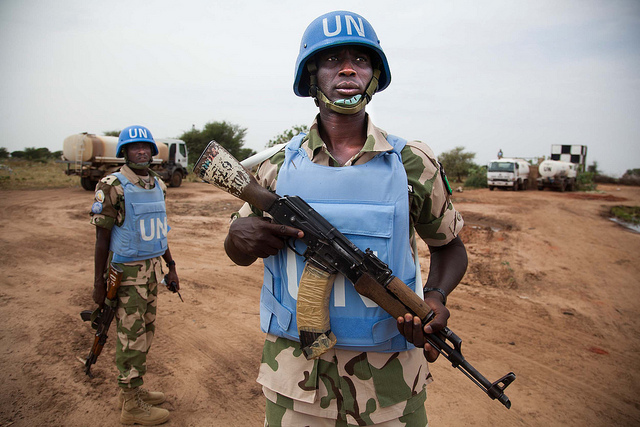The Ways And Means Of Boko Haram
/Michael Ransom, Contributing EditorLast Modified: 19:15 p.m. DST, 9 May 2014
 BORNO, Nigeria -- Modeled in the image of the Taliban and affiliated with the al Qaeda network, Boko Haram is not a newcomer to the industry of terror. Posing as a legitimate branch of Islam, the dangerous extremist group has orchestrated a campaign of heinous crimes against humanity for the past five years.
BORNO, Nigeria -- Modeled in the image of the Taliban and affiliated with the al Qaeda network, Boko Haram is not a newcomer to the industry of terror. Posing as a legitimate branch of Islam, the dangerous extremist group has orchestrated a campaign of heinous crimes against humanity for the past five years.
Operating in northern Nigeria and parts of Cameroon and Niger, the insurgents have recently stirred international attention after abducting more than 250 young women from an all-girls boarding school in Chibok last month. While the Borno-based kidnappings have rightfully triggered media outrage, Boko Haram's other efforts are equally disturbing.
On Monday, 5 May 2014, the guerrillas waged a 12-hour massacre on civilians in the small town of Gamboru Ngala, located in the northeast corner of Nigeria. Just miles from the Cameroon border, the assailants stormed a local market, firing upon patrons and later burning the bazaar. Boko Haram bombed the police headquarters and destroyed community buildings, burning many victims alive. Nigerian officials estimate the death toll at 300.
The mission of Boko Haram is fragmented at best. Outspoken leader Abubakar Shekau is an equal opportunity hate monger, whose agenda targets Christians, Muslims and state and local governments. Tenets of Boko Haram include the strict compliance of Sharia law, which codifies gender roles and regulations according to the Quran.
Boko Haram formed as a response to perceived issues in the Nigerian government, and they intend to oust President Goodluck Johnathan. In a sense, the continued existence of the extremists and the relative ease at which the group is able to operate is seeming confirmation that problems persist in the standing administration. As a whole, the police force in Nigeria is seen as impotent, and as a result many crimes are never reported to authorities.
The beginnings of Boko Haram indignation and hostility trace back to unresolved cultural clashes and a lack of security presence. Human Rights Watch documents the ongoing battle between Christians and Muslims in Plateau and Kaduna States. Many Nigerians are upset with President Johnathan's response to the murderous feud and expect government action to stop future attacks. The problem, of course, is that Boko Haram's solution to the nonintervention is further bloodletting.
In the past year, Boko Haram has waged three underreported onslaughts on various schools located in Yobe State. Each attack follows a similar plan--insurgents break into boarding schools during early morning hours, throwing explosives into dormitories and bombarding children with heavy gunfire.
1 2 Next Page »
Published: 9 May 2014 (Page 2 of 2)
The July 2013 massacre at Yobe State School left 42 dead. 44 students perished at Gujba College in September 2013. And 59 boys were killed during the bombing and burning of the Federal Government College of Buni Yadi in February 2014. These tragedies eclipse any mass shooting in the United States in terms of scale, but receive significantly less media consideration.
It is no coincidence that Yobe and Borno States border one another. Together, they represent the cradle of Boko Haram activity. The geographic and political makeup of northern Nigeria help to explain the persistence of regional violence and extremism. Throughout rural and remote states, Boko Haram targets young men who live in severe poverty. The promise of resources, weapons and food provisions is enough to gather an increasing number of recruits.
But poor and powerless individuals are not the only ones buying into the warped ideology. Given the size and strength of the Boko Haram militia, numerous local governments and politicians pay the insurgents for protection. Extortion money remains the fiscal backbone of the organization. In some cases, local officials give Boko Haram leadership outright control. According to some estimates, these terrorists are the acting rulers in almost a third of all local governments in Borno.
While parts of northern Nigeria are dangerous, and the need for protection is an unfortunate reality in the region, certainly Boko Haram is the chief reason a village would need defense in the first place. Financing from local councils only serve to keep communities and leaders out of the firefight.
Nevertheless, this financial support keeps the dangerous rebel organization viable and keeps neighboring townships in a treacherous position. It seems that no person and no group is safe from the extremism embraced by Abubakar Shekau and his operation. As evident by the August 2011 assassination of Muslim leader Liman Bana, the Islamic establishment is as much a threat to Boko Haram as the Christian equivalent.
Nigeria is Africa's most populous nation and also its largest economy. But the massive gap in wealth between the oil-endowed southern states of Nigeria and the agrarian north also plays into the tensions between the haves and the have-nots. Rooted in this inequity and growing stronger in the manure of hatred, Boko Haram continues to threaten peace and sensibility throughout the Continent.
Return to Page 1 »
Follow Michael on Twitter Twitter: @nahmias_report Contributing Editor: @MAndrewRansom
Related articles
- Behind the rise of Boko Haram - ecological disaster, oil crisis, spy games (theguardian.com)
- Boko Haram: Who are the radicals kidnapping Nigeria's schoolgirls? (itv.com)
- Shekau made Boko Haram more ruthless (vanguardngr.com)
- British, U.S. teams join search for kidnapped girls in Nigeria (news.yahoo.com)
- How Do You Solve a Problem Like Boko Haram? (mile2herald.wordpress.com)














